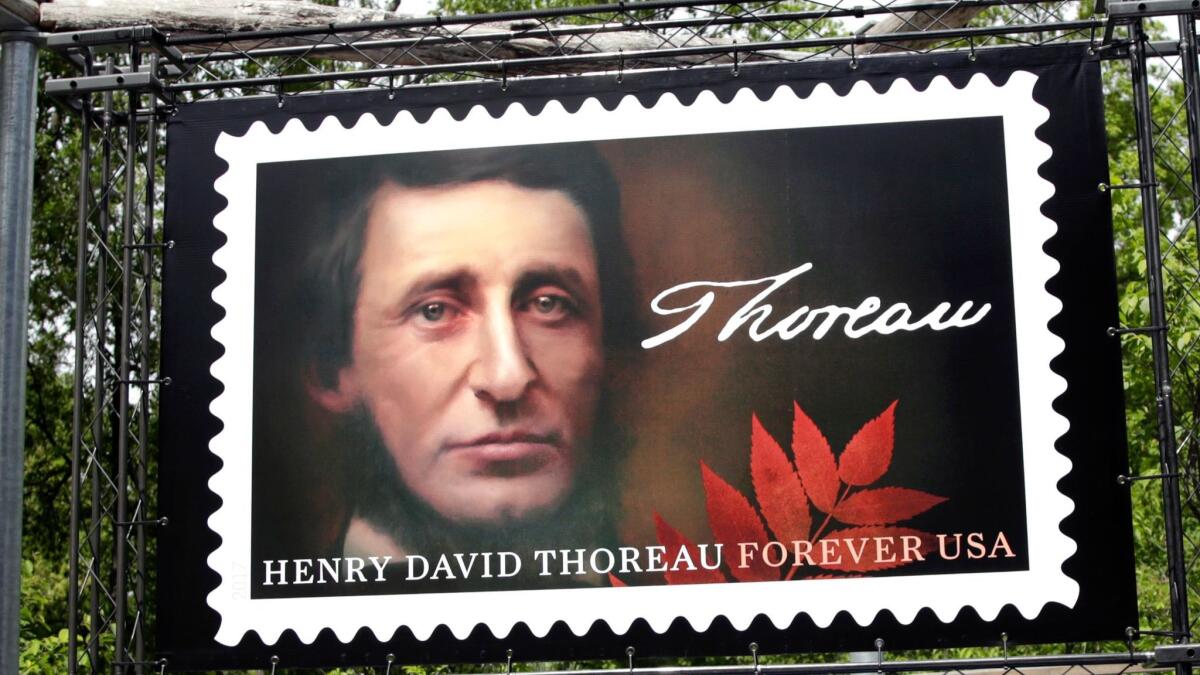Happy 200th birthday, Henry David Thoreau!

- Share via
Henry David Thoreau, the essayist and poet whose book “Walden” still resonates with fans of nature and the environment in the modern era, was born 200 years ago Wednesday.
Admirers of the pioneering transcendentalist author can visit Walden Pond, which is now a National Historic Monument, or the house where he was born, both in Concord, Mass. This summer, in honor of the writer’s 200th birthday, admission to the Thoreau Farm is free.
Thoreau’s writing career took off in 1849 with the publication of the essay “Resistance to Civil Government,” more popularly known today as “Civil Disobedience.” In 1854, he published the book he remains best known for, “Walden; or, Life in the Woods.” The memoir chronicled the two years he spent living in a small house near Walden Pond in Concord, on the land of his friend Ralph Waldo Emerson, where he had gone to “live deliberately ... sturdily and Spartan-like.”
The book sold poorly, and only came to wide attention after Thoreau’s death. But it remains an iconic text for advocates of “simple living” and conservation of nature.

“Simplify, simplify,” Thoreau urged in the book. “Why should we be in such desperate haste to succeed, and in such desperate enterprises? If a man does not keep pace with his companions, perhaps it is because he hears a different drummer. Let him step to the music which he hears, however measured or far away.”
His writings are still a mainstay of school curricula across the country, but he’s also been the subject of some more unusual tributes.
USC Games Program director Tracy Fullerton released a first-person, 3-D video game based on his writings, “Walden,” this year.
“Players follow in [Thoreau’s] footsteps, surviving in the woods by finding food and fuel and maintaining their shelter and clothing,” reads the official description of the game. “At the same time, players are surrounded by the beauty of the woods and the Pond, which hold a promise of a sublime life beyond these basic needs. The game follows the loose narrative of Thoreau’s first year in the woods, with each season holding its own challenges for survival and possibilities for inspiration.”
Those looking for a more traditional way to pay respect to Thoreau can always turn to his writings, of course, which still remain relevant, more than 150 years later.
A committed abolitionist, Thoreau wrote his essay “Civil Disobedience” as a criticism of the American government and slavery, and urged his readers to resist by not paying taxes.
“Is a democracy, such as we know it, the last improvement possible in government?” he wrote. “Is it not possible to take a step further towards recognizing and organizing the rights of man? There will never be a really free and enlightened State until the State comes to recognize the individual as a higher and independent power, from which all its own power and authority are derived, and treats him accordingly.”
If a man does not keep pace with his companions, perhaps it is because he hears a different drummer.
— Henry David Thoreau
In “Walden,” Thoreau took on, among other things, technology. “Our inventions are wont to be pretty toys, which distract our attention from serious things,” he wrote. “They are but improved means to an unimproved end, an end which it was already but too easy to arrive at.”
Thoreau died at 44 in 1862 of complications from tuberculosis, which he lived with for much of his life. He is buried at “Author’s Ridge,” a hill in Concord’s Sleepy Hollow Cemetery, also the resting place of Ralph Waldo Emerson, Nathaniel Hawthorne and Louisa May Alcott.
More to Read
Sign up for our Book Club newsletter
Get the latest news, events and more from the Los Angeles Times Book Club, and help us get L.A. reading and talking.
You may occasionally receive promotional content from the Los Angeles Times.





